
The Anthomyiidae are a large and diverse family of Muscoidea flies. Most look rather like small houseflies. Most species are drab grey to black. Many Pegomya are yellow, and some members of the genera Anthomyia and Eutrichota are patterned in black-and-white or black-and-silvery-grey. Most are difficult to identify, apart from a few groups such as the kelp flies that are conspicuous on beaches.
Pegoplata, sometimes known as Nupedia, is a genus of flies within the family Anthomyiidae.

Delia flies are members of the Anthomyiidae family within the superfamily Muscoidae. The identification of different species of Delia can be very difficult for non-specialists as the diagnostic characteristics used for immature and/or female specimens may be inconsistent between species. Past taxonomic keys were not as comprehensive in their identification of Delia specimens; they were either too reliant on genetic characteristics, focused solely on a specific life stage, or were focused only on certain species. However current taxonomic keys aim to be more thorough by not only including morphological diagnostics for males, females, and immature specimens of various species, but also their genetic make-up or molecular barcode.

Lucilia is a genus of blow flies in the family Calliphoridae. Various species in this genus are commonly known as green bottle flies.

The genus Scathophaga are small to medium sized predatory flies that for the most part, have larvae that feed on other insect larva within animal dung or decaying vegetable matter. Many are highly variable, sometimes producing small, infertile males that superficially resemble females. This species is an example of an organism which may selectively store the sperm of multiple males, as females have three to four spermathecae.

Phaonia is a very large genus from the fly family Muscidae. It is distributed worldwide, with more than 750 species having been described.
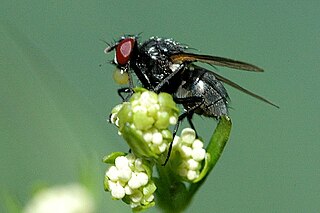
Hydrotaea is a genus of insects in the housefly family, Muscidae. They occur in most regions of the world but are more populous in warmer climates. They are often found on feces in summer months, and are therefore generally found in close proximity to livestock. Among the 130 known species in this genus, one of the most commonly recognized is the dump fly.

Melinda is a genus of flies in the family Calliphoridae. In general little is known of their biology. A few species have been reared from snails. One – Melinda gentilis – is parasitic in the snails Helicella virgata and Goniodiseus rotundata and Melinda itoi is a parasite of the snail Acusta despecta sieboldiana.
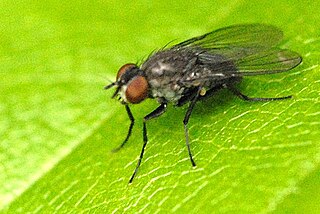
Coenosia is a very large genus of true flies of the family Muscidae. Coenosia are known as tiger flies since they are predators and hunt many kinds of insects and other invertebrates.
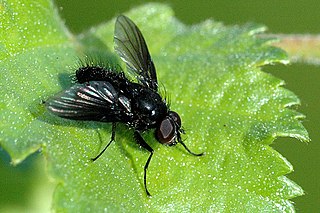
Spilogona is a very large genus of flies from the family Muscidae.
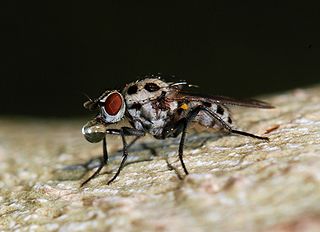
Anthomyia is a genus of flies in the family Anthomyiidae. They look rather like small houseflies, but commonly have conspicuous black-and-white patterning. This appears to be a mild form of aposematic coloration, though they do not appear to be distasteful unless they have eaten something offensive to the predator and have loaded their guts with it.
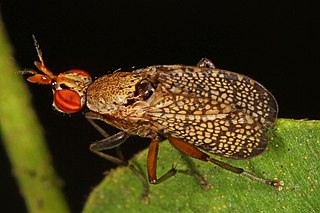
Tetanocerini is a tribe of flies in the family Sciomyzidae. There are more than 400 described species in the tribe.
Caricea is a genus of house flies, in the family Muscidae. There are at least 30 described species in Caricea.

Leucophora is a genus of root-maggot flies in the family Anthomyiidae. There are at least 60 described species in Leucophora.
Orbellia is a genus of flies in the family Heleomyzidae. There are about 13 described species in Orbellia.

Cordilura is a genus of dung flies in the family Scathophagidae. There are more than 90 described species in Cordilura.

Chirosia is a genus of root-maggot flies in the family Anthomyiidae. There are over fifty described species in Chirosia.

Hylemya is a genus of root-maggot flies in the family Anthomyiidae. There are at least 30 described species in Hylemya.

Alliopsis is a genus of root-maggot flies in the family Anthomyiidae. There are at least 70 described species in Alliopsis.

















